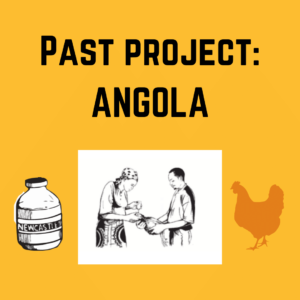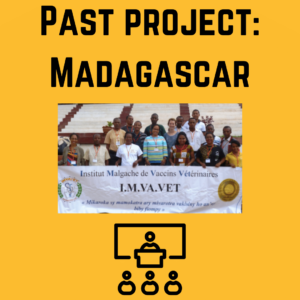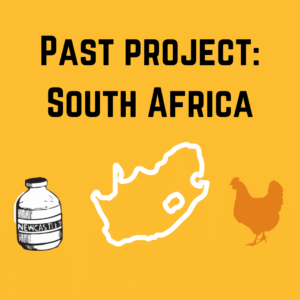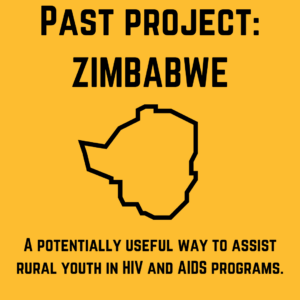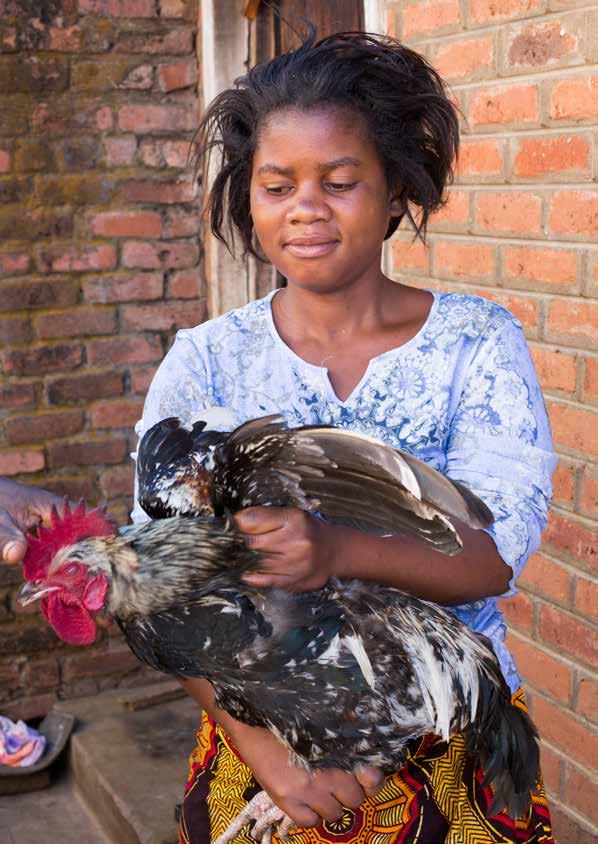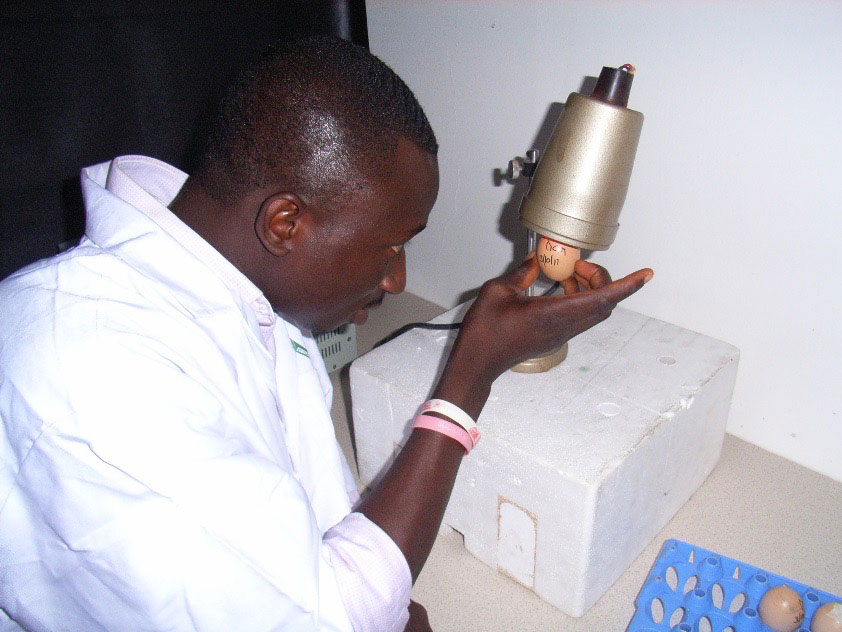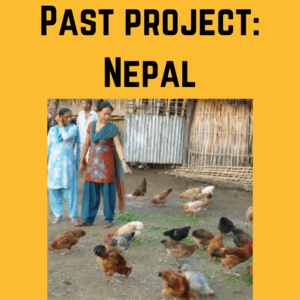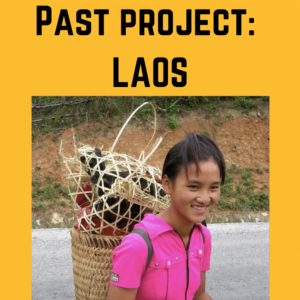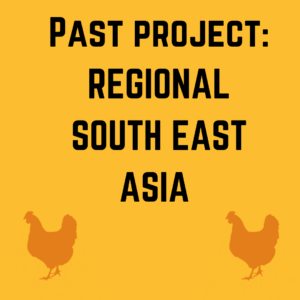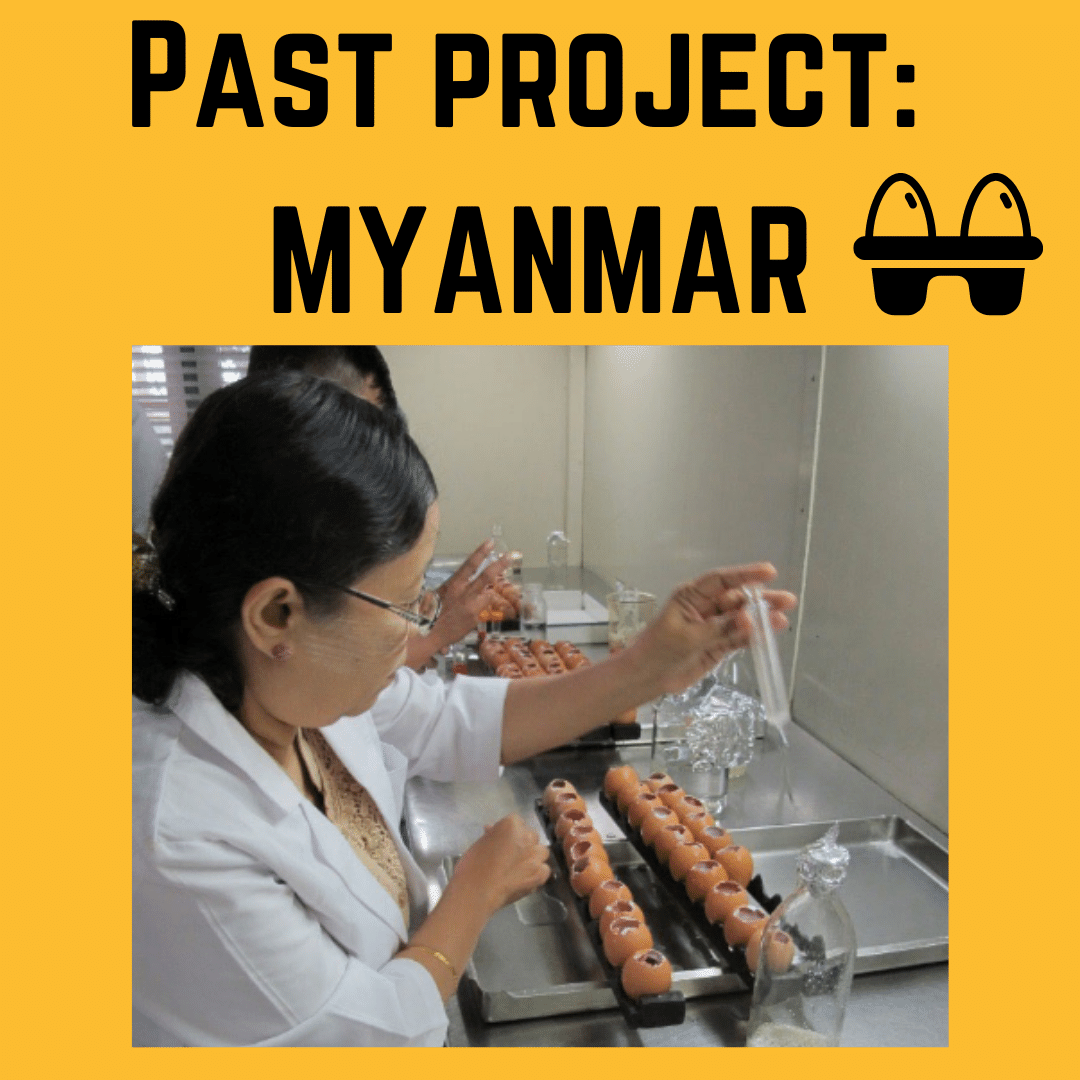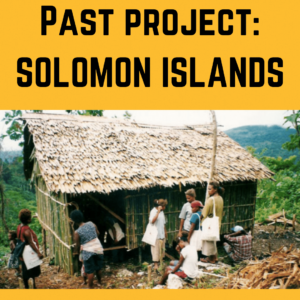AFRICA
Supporting small-scale farmer decision making through data generated from Mkulima Young online marketplace. Read more. 
Village poultry for better livelihoods in Mbuji Mayi in the Kaisai-Oriental province. Read more.
Nkuku4U – Enhancing the traditional village chicken-crop system – Read more.
The Angolan government requested support to set up a program to reduce and control outbreaks of Newcastle disease, which is a major concern for disadvantaged rural communities in Angola.
In response, the European Commission funded Kyeema to work directly with the Angolan government from 2009-2012 to set up I-2 Newcastle disease vaccine production and trial its use in the field.
The program was based in Lubango in the south of Angola and worked directly with the Angolan Veterinary Services Institute of the Ministry of Agriculture and Rural Development. There was a strong desire from the Angolan government to get ND vaccination programs up and running as quickly as possible.
Assosiate Professor Robyn Alders undertook an inception visit to Angola in October 2008 to design the program and later joined the project as Team Leader in July 2011. Under the project Kyeema assisted the government to purchase additional laboratory equipment, consumables and to rehabilitate the laboratory electrical system and the cool room. Kyeema also trained laboratory personnel in the production and quality control of the I-2 vaccine and established twinning activities between the vaccine production laboratories in Angola and Mozambique. The Angola Minister of Agriculture, Rural Development and Fisheries inaugurated the laboratory on 3 May 2012.
Although the project officially ended on 17 May 2012, ongoing twinning support of activities by staff of the Directorate of Animal Science of the Mozambican Agricultural Research Institute continues. We are very hopeful that it will have a lasting positive impact for rural women who depend on chickens for a livelihood.
Family poultry production for wildlife conservation in Madagascar
Members of the International Rural Poultry Centre of Kyeema have been involved in the program since its inception in 2011.
This has been in the form of scoping activities, community liaison, vaccine production technical input and vaccinator training.
In January 2016 a three day workshop was conducted at the National Veterinary Vaccine Institute to provide technical support for local production on the thermotolerant I-2 vaccine. Mr. Amilcar da Silva (Mozambique), Master Trainer of the I-2 ND vaccine based at the Directorate of Animal Sciences (DCA) in Maputo, was contracted to lead this workshop. In February 2016 a “training of trainers” workshop by Dr Julia De Bruyn (Australia) was led for those who will go on to conduct community based workshops for community vaccinators.
The first vaccination campaign took place in the Makira Protected Area in April 2016 and work continued with producing I-2 vaccination, establishing distribution procedures, training vaccinators and raising community awareness of the potential for ND control through vaccination.
Funding source: San Fransisco Zoo, USA
Partners: University of Sydney
Wildlife Conservation Society
In January 2005, Dr Robyn Alders shared experiences of poultry raising in rural communities with poultry group members from the JICA-funded livestock project in Limpopo Province, South Africa.
One of the components of the livestock project was the promotion of existing village chickens for rural household security and low levels of income generation. She visited communities in Mphanama, Strydkraal and Manganeng districts and facilitated a workshop to share poultry raising experiences from Mozambique, including Newcastle disease control activities.
These districts of Limpopo Province are dry areas with erratic, unreliable rainfall. Vegetation is under pressure from a system of communal management and utilisation. In general, little productive vegetation is found around the household areas. The project group wanted to gain some perspective and experience of the role of feed resources for village chickens being raised in similar conditions in Mozambique.
Approximately 50 participants from Mphanama, Strydkraal and Manganeng districts attended the workshop to share and learn from experiences in Mozambique. Robyn was asked to address questions such as, “Are village chickens able to sustain themselves just by scavenging around the house?” and “Do villagers supplement the diet of chickens.” The main issues covered at the workshop were chick mortalities, feeding, predators and diseases.
In follow-up to the workshop, four technical officers from the project visited Gaza Province in Mozambique to share experiences on village poultry production with farmers and extension workers and to observe village chicken research and development activities. They also learnt about the low-cost method for vaccinating village chickens against Newcastle disease.
Junior Farmer Field Schools Pilot Project
The JFFS provides technical, business and life skills, while at the same time providing some constructive activities (and avoiding risky ones) to help junior farmers to get started in income generating enterprises and help support their families, and themselves, into the future.
The International Crops Research Institute for the Semi-Arid Tropics (ICRISAT) proposed using poultry as a model to develop farming/entrepreneurial skills that would yield several benefits. The high turnover rate of poultry allows for the rapid exposure of JFFS members to production and market processes, and is valuable in the financial management planning and learning process as well. Members can learn about extensive and semi-intensive production systems to enable them to choose the production system(s) best suited to their individual situation.
Small-scale poultry production combines easily with other on-farm activities, e.g., chicken manure can be used to fertilize the family garden and to supply nitrogen required in dairy cow diets. As young farmers develop their skills they may graduate to other forms of agriculture; these may include bee keeping, pig production and milk production.
The IRPC was invited to assist ICRISAT to develop and test curriculum and training modules on extensive and/or semi-intensive poultry production, for use in both Farmer Field Schools and Junior Farmer Field Schools (the latter targeting youth involved in HIV/AIDS mitigation and prevention programs) in Zimbabwe.
Participatory curriculum development activities revealed that JFFS members are generally interested in poultry production. A range of participatory rural appraisal (PRA) tools were used to gain information on poultry production and poultry farmers’ aspirations. Members of the JFFS were also invited to write down topics they would like included in the JFFS poultry curriculum. The process indicated that the JFFS members wished to know more about general poultry husbandry (e.g. housing, feeding, watering and disease control) and basic avian physiology (e.g. reproductive cycles).
The IRPC facilitated sessions on improving village chicken production and also assisted workshop participants to prepare three comparative trials to be conducted by the JFFS poultry groups. Due to the lack of reference material dealing with the improved production of indigenous poultry, the IRPC placed considerable emphasis on the preparation of a manual for JFFS facilitators.
The JFFS program can have a significant impact on how rural communities adapt to living with the consequences of HIV/AIDS. With the lessons learnt in this pilot program it is expected that the JFFS program can be improved and expanded to enable young farmers to not only survive but also actively contribute to their communities.
“We raise chickens for their eggs and so that they increase in number so that we can sell and get money. This money will help me to buy what I want. If I have a visitor I can slaughter them and get relish. If a child fails to get school fees, the chicken can be sold to get money. Money to buy sadza comes from chickens. Chickens give manure that we use in our gardens for green vegetables and tomatoes. The other thing I can do is to buy clothes using chickens. When celebrating a birth I can also use a chicken as a gift. When I want someone to work in my fields, I can slaughter a chicken. I can also eat the eggs with sadza.”
Ms. Nomsa Nkomo, JFFS member, Vukuso Village
Regional Newcastle Disease Control Project: Malawi, Mozambique, Tanzania and Zambia
The support provided from 2006 through to 2014 has strengthened the capability of, and relationship between, stakeholders in order to successfully implement ND control programs and achieve a decrease in chicken mortality rates caused by ND in project areas. Through these activities, village poultry production has been increased and this will contribute to food security and poverty alleviation of the population in project areas. Kyeema staff have been involved with Australian funded ND control activities in southern Africa since 1998, when the first trial work was undertaken in Mozambique. The work expanded to a regional activity funded for Tanzania, Malawi and Mozambique from 2002-2005, with Zambia added in 2009.
Our key project partners in each country were the respective Ministries of Agriculture/ Livestock Development and Fisheries; and the Central Veterinary Laboratories in Malawi and Tanzania; the Central Veterinary Research Institute in Zambia and the Directorate of Animal Science of the Mozambican Agricultural Research Institute.
Dr Bob Pym conducted the end of Project Evaluation. His report discusses the success of the project in meeting its overall goal of improving the level and efficiency of poultry production in the project areas and of contributing meaningfully to food security and poverty alleviation. He wrote:
“This project represents a most impressive logistical undertaking, bringing together as it does the development of I-2 ND vaccine production capability in the four countries and the effective distribution to, and promotion and testing of this in village communities through close involvement of government personnel in community education and training programs.….The qualitative PRA data suggests quite a dramatic impact upon the project goals of poverty alleviation and home food security in those households following the promoted ND control program, in many of the regions.”
Project activities have contributed to a more robust approach to addressing ND control by supporting I-2 vaccine production and human resource development at the central veterinary laboratories, raising awareness of ND control and implementation of regular vaccination campaigns in the four countries involved.
In Tanzania, Malawi and Mozambique there is a significant increase in participation in vaccination campaigns and, in general, an increase in the flock size and percentage of households owning chickens. Farmers reported fewer deaths in chickens since vaccination and ND is no longer identified as the main cause of death. In Zambia the laboratory trials on vaccine have been completed and vaccine has been prepared for the field trials. The cost of vaccine production and distribution was estimated. Community vaccinators and community leaders were trained in ND control in preparation for the field trial.
Laboratory assessment and training activities in Ghana, Senegal, DRC, Ethiopia, Tanzania and Lesotho
Kyeema provided general advice and undertook a series of assessment and training activities supporting I-2 Newcastle disease vaccine related activities in Africa under a subcontract with the Global Alliance for Livestock Veterinary Medicines (GALVmed).
Activities undertaken include:
Ghana: Dr Mary Young undertook two visits to the Accra Veterinary Laboratory – an initial needs assessment visit, followed by a review of progress on recommendations made during first visit, in order to improve I-2 ND vaccine production capacity and support sustainable vaccine production for ND I-2. Together with Dr Zuhara, she undertook a follow-up visit to Ghana to conduct a workshop on I-2 ND vaccine production and quality control, with eight participants from Ghana and the DRC attending.
Senegal: Dr Mary Young conducted a needs assessment of the vaccine production unit at the Senegal Agricultural Research Institute and made recommendations for improvements to support sustainable vaccine production for ND I-2.
DRC: Dr Mary Young undertook two visits to the Central Veterinary Laboratory in Kinshasa – an initial needs assessment visit, followed by a review of progress made to date on recommendations made during first visit, in order to improve their ND vaccine production capacity.
Ethiopia: Dr Mary Young visited the National Veterinary Institute in Debre Zeit to review and discuss SOPs for production (including freeze-drying), testing and distribution of I-2 ND vaccine, results of vaccine stability testing, and vaccine labeling, packaging and information that accompanies the vaccines.
Tanzania: Kyeema Master Trainers Drs Msami and Shirima conducted cold chain training for veterinary service providers and training of trainers for Ward facilitators from a pilot project area in Tanzania. 19 service providers participated in cold chain training and 33 Ward Facilitators attended improved poultry management and more specialised training in ND control training using the thermotolerant I-2 vaccine.
Lesotho: Kyeema Master Trainers Drs Msami and Shirima conducted a similar program for ten Agricultural Technical Officers in Lesotho. Training focused on the use of freeze-dried I-2 ND vaccine applied via eye drop, aspects of village chicken husbandry practices and the cold chain. This was followed by training of forty Community Vaccinators in important aspects of poultry management and more specialised training in ND control.
Africa Cross-Border Disease Surveillance Project
Highly pathogenic avian influenza (HPAI) can be spread by trade in poultry. Understanding the behaviour of people engaged in poultry production, trade and processing is necessary to understand the motivation for change and successful disease control. In June 2010, Kyeema signed an agreement with FAO to collaborate in a multi-disciplinary approach to common border HPAI surveillance sampling.
Cross-border legal and illegal poultry trade flows, including quantification of trade;
Knowledge of the detection, identification and surveillance of diseases in the different target groups, specifically HPAI; and
Analysis of factors affecting HPAI preparedness as well as gender differences in knowledge, attitudes, and behaviour in relation to poultry trade and HPAI.
ASIA
Vaccine Cold Chain training
Dr. Mary Young carried out an assessment of the Central Biological Production Laboratory in Kathmandu and participated in a Cold Chain Refresher Workshop at a Newcastle disease pilot project area in Nepal.
Retailers/distributors of veterinary inputs, community facilitators, community animal health workers, veterinary experts, and the NGO implementing the project in the project area all participated in the workshop. The important features of the cold chain, cold chain management and vaccine handling were discussed.
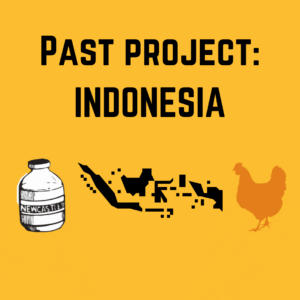 Support for Avian Influenza Control in Indonesia
Support for Avian Influenza Control in Indonesia
During 2006-2008, Kyeema provided an international expert on Highly Pathogenic Avian Influenza (HPAI), Dr Mary Young, to work with both Provincial and central Governments in the development and implementation of provincial strategies for North Sumatra and Banda Aceh and a national strategy for the management of highly Pathogenic Avian Influenza, working closely with the Ministry of Agriculture.
She also assessed the efficacy of the national strategy towards Newcastle disease and Highly Pathogenic Avian Influenza (HPAI) in Banda Aceh and North Sumatra in Indonesia.
South-East and East Asian countries have been severely affected by Highly Pathogenic Avian Influenza (HPAI). This follows the emergence of a new virulent strain of virus in southern China in 1996 and its subsequent spread throughout the region since 2003. From past experience, it is understood that intimate contact between livestock (poultry and swine) and people in parts of Asia creates a favourable situation for the evolution of a human pandemic strain. The current strain of the virus (designated H5N1 by virtue of the characterisation of surface markers) has already demonstrated its ability to infect and kill people. It has been fatal in approximately 50 per cent of people who have tested positive for the disease. To date, there is limited evidence of person-to-person transmission. Swine and other affected mammals appear to be only incidentally infected, playing no significant role in virus transmission. However, this situation could change rapidly and the emergence, by recombination or mutation, of a highly pathogenic strain of Influenza which could transmit rapidly between people and cause a global pandemic is a matter of international concern. The most effective means of protecting human welfare is to combat the precursor virus in its Avian hosts, thus pre-empting the appearance of a pandemic strain.
Dr Young created standard operating procedures (SOPs) for prevention, containment and control of Avian Influenza and Newcastle disease in poultry distribution schemes and vulnerable communities. She also assessed emergency preparedness procedures for HPAI and advised on improving the current system and documented the findings in a comprehensive report aimed at providing guidance for FAO, official veterinary services and NGOs.
Laos: Highly Pathogenic Avian Influenza Technical Advice
In March 2005, FAO requested Dr Robyn Alders to work as a short term technical adviser to assist in the decentralized team of the Emergency Centre for Transboundary Animal Diseases (ECTAD) in Lao PDR.
She provided the FAO representative with technical expertise and guidance on animal health and Avian Influenza issues, including collaborating on the review and preparation of technical reports, project concept notes, proposals, briefing documents and related information on Avian Influenza. She also ensured general supervision and coordination of project activities and facilitated and participated in national technical meetings, workshops and training sessions on Avian Influenza with government groups, the donor community and multilateral agencies.
The report suggested improvements to information, education and communication material relating to the prevention and control of Avian Influenza, to facilitate the development of the most effective program to control Avian Influenza in Laos PDR.
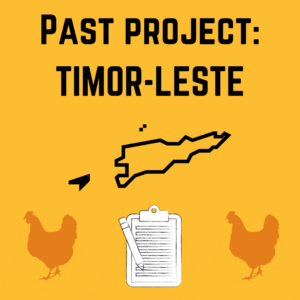 Timor-Leste: Highly Pathogenic Avian Influenza Technical Advice
Timor-Leste: Highly Pathogenic Avian Influenza Technical Advice
The Food and Agriculture Organisation (FAO) of the United Nations requested Dr Robyn Alders to be a member of the National Task Force for Avian Influenza in Timor-Leste.
The role of the Task Force was to prepare a Preparedness and Response Plan for Highly Pathogenic Avian Influenza (HPAI). Although Timor-Leste is free from HPAI, the disease is endemic in most provinces of Indonesia (the country’s nearest neighbour with which it shares a land border). Timor-Leste is also at risk of contracting HPAI because of farming systems that include close contact between people, poultry and swine.
Dr Alders assisted the Task Force to facilitate development of a manual on the prevention and control of HPAI for Veterinarians and District Livestock Officers in Timor-Leste. She also assisted in the development and revision of improved village and small-scale poultry production strategies and programs that mitigate risk and support the prevention and control of HPAI. Government livestock and NGO staff were trained in the new strategies and active surveillance for HPAI in the border districts was implemented.
South-East Asia: Highly Pathogenic Avian Influenza Technical Advice
In July 2006, Dr Robyn Alders was asked by the International Rural Poultry Centre (IRPC) to assist FAO in the context of the National Integrated Plans for Avian Influenza Control and Human Pandemic Preparedness and the FAO Strategic Framework for HPAI Prevention and Control in Southeast Asia. The main outcome of the project was to facilitate the implementation of Preparedness, Prevention and Response Plan for Highly Pathogenic Avian Influenza in Animals in South-East Asia.
South-East and East Asian countries have been severely affected by Highly Pathogenic Avian Influenza (HPAI).
This follows the emergence of a new virulent strain of virus in southern China in 1996 and its subsequent spread throughout the region since 2003. From past experience, it is understood that intimate contact between livestock (poultry and swine) and people in parts of Asia creates a favourable situation for the evolution of a human pandemic strain.
The current strain of the virus (designated H5N1 by virtue of the characterisation of surface markers) has already demonstrated its ability to infect and kill people. It has been fatal in approximately 50 per cent of people who have tested positive for the disease. To date, there is limited evidence of person-to-person transmission. Swine and other affected mammals appear to be only incidentally infected, playing no significant role in virus transmission. However, this situation could change rapidly and the emergence, by recombination or mutation, of a highly pathogenic strain of Influenza which could transmit rapidly between people and cause a global pandemic is a matter of international concern. The most effective means of protecting human welfare is to combat the precursor virus in its Avian hosts, thus pre-empting the appearance of a pandemic strain.
Dr Mary Young visited the Viral Vaccines Production Laboratory, Livestock Breeding and Veterinary Department in Yangon in September 2014 to provide support and professional guidance on the production of I-2 Newcastle disease (ND) vaccine.
She conducted a workshop on I-2 ND Vaccine Production and Quality Assurance at the Viral Vaccines Production Unit, to refresh the participants’ knowledge of and skills in I-2 ND vaccine production, testing and distribution. This was achieved through discussions and problem solving exercises. Staff members from the I-2 production units in Yangon and Taunggyi participated.
The workshop was funded by the University of Queensland under an Australian Centre for International Agricultural Research (ACIAR) project ‘Improving livelihoods of small scale livestock producers in the Central Dry Zone through research on animal production and health in Myanmar’.
PACIFIC
Happy Chicken project. Read more.
Solomon Islands: Improved Village Poultry Keeping
Russell Parker has dedicated many years to improving village poultry keeping in the Solomon Islands.
Over 80% of the 500,000 population of the Solomons live in a rural subsistence lifestyle, with village poultry the primary source of dietary protein. More than 30% of the children are malnourished and the population generally is protein starved.
Through the use of simple improved poultry husbandry principles, village chicken production can be quickly increased so there is much more meat and eggs to supplement peoples’ meals.
The majority of the village farmers have very small incomes and are not able to utilise the expensive commercial chicken breeds or processed feeds.
So the main training principles are based around the use of local building materials for housing, local acclimatised chicken breeds and balanced feed supplies from the peoples’ improved village food gardens. The use of improved village food gardens and acclimatised indigenous chicken breeds is also proving to be the main stay of new Pacific wide Climate Change Adaptation projects providing more diverse and reliable food sources for the people following Climate Change events.
Surpluses of meat, eggs and live birds can all be easily sold to provide small cash incomes for family needs like school fees, kerosene for lighting or other important necessities.
Kyeema was granted funds by GRM International to support Russell with the implementation of a training manual and to undertake training of village trainers, as well as villagers themselves, right across the country.
The training workshops produced fifteen master trainers from various areas of the Solomon Islands, who are now capable of conducting training sessions in improved village chicken management. These trainers were also involved in expanding the use of these concepts across the western Pacific area. From this training and assistance, the people in the villages have benefited from sustained food and income.
The training manual is now available in hardcopy, CD and online here at the Pacific Islands Farmers Organisation Network. Further specific poultry keeping advice is also available through this site.




